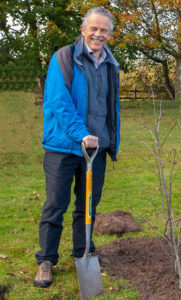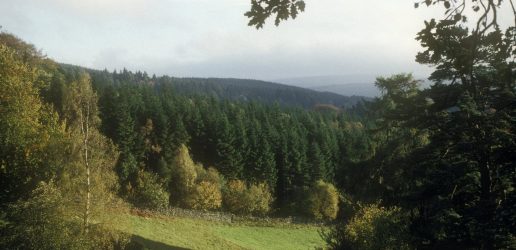Chris Quine has recently been made a Fellow of the Royal Society of Edinburgh. To celebrate this achievement, Chris spoke to us about what this recognition means to him. He also tells us of his time at Forest Research, gives advice to those considering a career in scientific research and shares his thoughts on the future of forest science.

‘Chuffed!’ would be one way of summing up how I feel about becoming a Fellow of the Royal Society of Edinburgh. Why so? I feel honoured to have been recognised in this way – nominated by my scientific peers and then selected in a competitive ballot by the existing fellowship of Scotland’s national academy, which spans many areas of expertise.
There have been experts in forest sciences within the RSE in recent decades, but only from academia. The last fellow from the Forestry Commission was George D Holmes (a former Director General of the Forestry Commission who retired in the mid-1980s). It also recognises the possibilities afforded by careers in Forest Research, reflecting the progress we have collectively made in recent years in raising the profile, relevance and breadth of our research. The RSE’s strapline is ‘Knowledge made useful’ and having worked for Forest Research, unashamedly an applied research organisation, for most of my career, this seems highly appropriate.
Forest Research has provided me with some fantastic opportunities since I joined as a junior project leader to study the effects of strong winds in causing windthrow and how to minimise such damage. I arrived at NRS (FR’s Northern Research Station) having spent 5 years in forest management in south Scotland, to what was regarded as a specialist tour (perhaps now it would be called a development opportunity!).
A few years in, I became convinced that research was the career for me. To equip me for such specialism, I was sponsored by FR to do a part-time PhD with Edinburgh University. This provided a springboard for the research and research management I’ve done since. I’ve been incredibly fortunate to work alongside some great colleagues across many scientific disciplines. I’ve collaborated with folk in many different organisations, engaged in some crucial topics, and helped Forest Research to adapt to ever changing circumstances (including times when our very existence was threatened).
I’d certainly recommend a career in applied research, and specifically research related to trees, woods and forests. What do you need? Adaptability is a great start – but perhaps the core characteristics are curiosity, commitment (not all research is exciting), community (a willingness to contribute to many teams), and communication (by which I mean very much an interest in the exchange of knowledge not the megaphone knowledge transfer version).
Currently there are unprecedented opportunities afforded by public and political interest in trees, woods, and forests. The bold plans to expand woodland cover and protect and restore forests within the UK and overseas requires underpinning with sound evidence, multiple ways of supporting decisions (whether in policy or practice), and skilled people. I hope the welcome recent upturn in funding for tree-related research is sustained so that our understanding can grow – providing exciting and fulfilling careers for many more forest scientists.
New research has been published which explores how to enable and encourage access to woodlands for diverse members of the public.
Forest Research has been involved in a project focusing on efforts to improve inclusivity in biosecurity practices by exploring how to integrate different knowledge systems into mainstream decision-making.

Forest Research has released the latest Accredited Official Statistics on woodland and forestry in the UK.
New research has been published which explores how to enable and encourage access to woodlands for diverse members of the public.
Forest Research has been involved in a project focusing on efforts to improve inclusivity in biosecurity practices by exploring how to integrate different knowledge systems into mainstream decision-making.

Forest Research has released the latest Accredited Official Statistics on woodland and forestry in the UK.